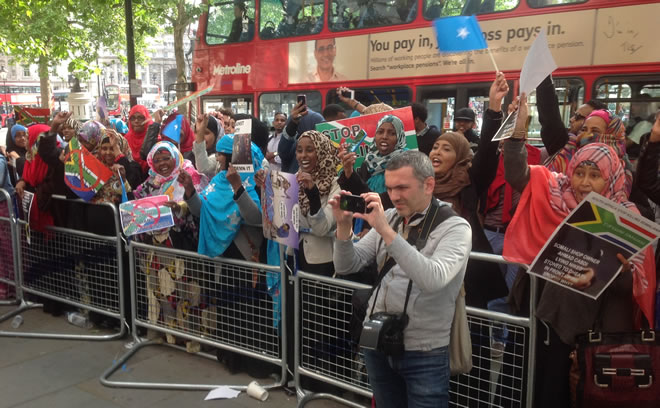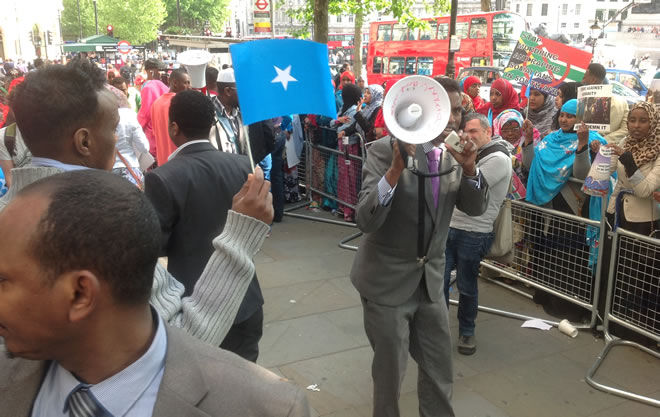
Somali community gather at Trafalgar Square to protest violence against Somali refugees in South Africa
By Samira Sawlani
Wednesday, June 12, 2013
Trafalgar Square in London was a hub of activity on the 7th and 8th of June when large numbers of the Somali community gathered in protest outside the South African Embassy. What resulted was a vocal and passionate atmosphere where demonstrators expressed their anger, rage and upset at the horrific stoning to death of 27 year old Somali grocery shop owner Abdinasir Mahmoud in Port Elizabeth.
Though this episode is the catalyst for Somali’s around the world to raise their voices, it is not an isolated incident. Aside from the killing of Mr Mahmoud, there has been widespread news of Somali owned businesses being looted, and riots taking place in a township in Johannesburg along with Port Elizabeth.
Thousands took to the streets in Mogadishu to air their disgust at the situation, the mayor of the city in his speech to the demonstrators’ spoke of his disappointment at the South African authorities’ lack of protection for the Somali community.
Prime Minister Abdi Farah was quoted as saying “I appeal to the Government of the Republic of South Africa as a matter of urgency to intervene and contain this unnecessary and unfortunate violence against Somali business communities to preserve peace and stability”
Several demonstrations have since followed in other parts of the globe as Somali’s present a united front against the attacks and injustices suffered by their fellow countrymen in South Africa.
In the UK, dozens held up the flag of Somalia, while numerous protestors carried signs with blazing slogans such as “Zuma we demand you stop killing Somalians”. The hardest hitting and disturbing placards being shown were those with the disturbing image of Abdinasir Mahmoud’s corpse bloodied and battered in the middle of the street.
Men and women from the community stood outside the embassy shouting into megaphones and chanting ‘We helped you during apartheid and you are killing us now”
Mohamed Cantoobo, Director of UK based organisation Act for Somalia spoke about the aim of the protest being not only to pressurise the South African government to protect Somali immigrants, but to “bring to justice those that were involved in the killings.”
He also pointed out that “Many South Africans are not aware of what Somalia did for them during apartheid.” This ignorance has soured an already bitter situation.
The commitment of the demonstrators sent a strong message to the South African authorities ‘You have let us down and something needs to change.’

When asked what she hoped to achieve by participating in the protest one young lady who had lived in South Africa for two years prior to moving to the UK did not mince her words “It is disgraceful that South Africans are targeting Somali’s based upon race. They of all nationalities know how it feels to be discriminated against based on race and creed.”
Another gentleman chimed in with his opinion “What is worse is that the authorities, the police, the government, those who are trusted to protect people have failed Somali’s in the country. Where were they when this attack and all previous to it were being carried out? Are our lives less worthy than that of other communities in South Africa? How many more incidents of murder and looting like this will it take for them to do something?”
A large group of youngsters from the community had also turned up to show their support, said they were motivated to participate in the protest after viewing the video clip of the murder. “We may be based all over the world but ultimately all Somali’s are our brothers and sisters. Our hope is that with such protests the South African people and government will take more seriously what our community is facing there and has faced for a long time. There has been a Somali presence in South Africa since 1991, even before some of us were born, yet they are being treated this way for what reason?”
General consensus going by the opinion of the protestors in London and elsewhere was that this attack, as well as others, is a result of xenophobia. To the frustration of many this claim has been disputed by government officials in South Africa.
Speaking at a media briefing International Relations and Cooperation Minister Maite Nkoana- Mashabane said "The looting, displacement and killing of foreign nationals in South Africa should not be viewed as xenophobic attacks, but opportunistic criminal acts that have the potential to undermine the unity and cohesiveness of our communities”
However, a number of protestors in London were quick to refute this saying that they believe that unemployment in many parts of South Africa leads to violence against foreigners. “Somali’s do very well in business in South Africa, opening stores in poorer areas. This can be frustrating for South Africans struggling with poverty, so they instantly blame foreigners and carry out heinous crimes such as those that have recently occurred.”
Writing for thoughtleader.co.za, David Cote from the Strategic Litigation Unit at Lawyers for Human Rights wrote ‘We need a clear stance from government and community leaders that there is a problem with xenophobia in South Africa.’
Xenophobic violence aimed mainly at Somali’s, Mozambicans and Zimbabwe occurred in South Africa in 2008 and left over 60 people dead and scores displaced. Since then the looting and attack of Somali owned businesses is not uncommon, however once again authorities claim this is down to business rivalry rather than xenophobic.
As the voices of protest continue to echo around the South African embassy, one wonders if and how Somali immigrants will heal from recent events. On thing they can be sure of is that around the world, their fellow countrymen and women will stand by them and that is a sign of patriotism and strength despite adversity.
www.twitter.com/samirasawlani